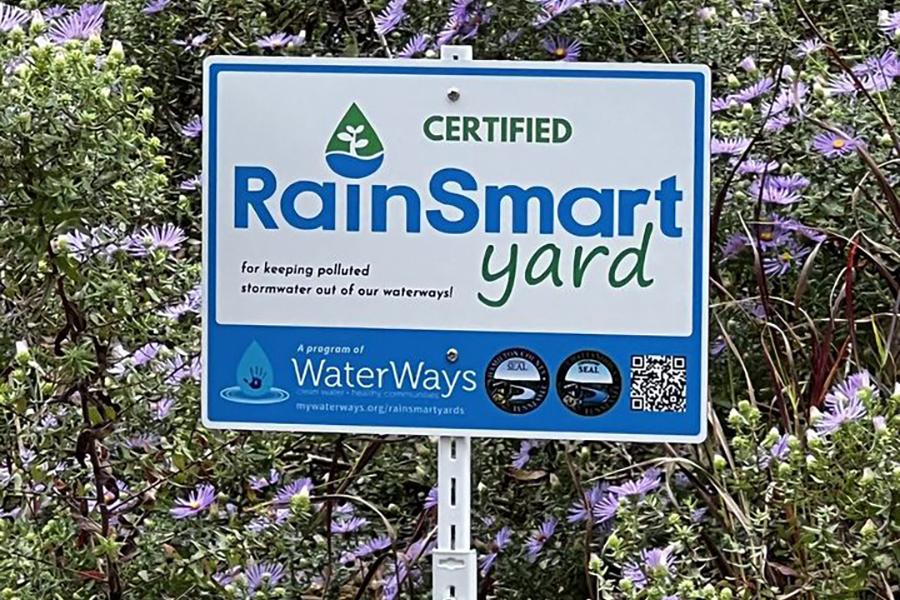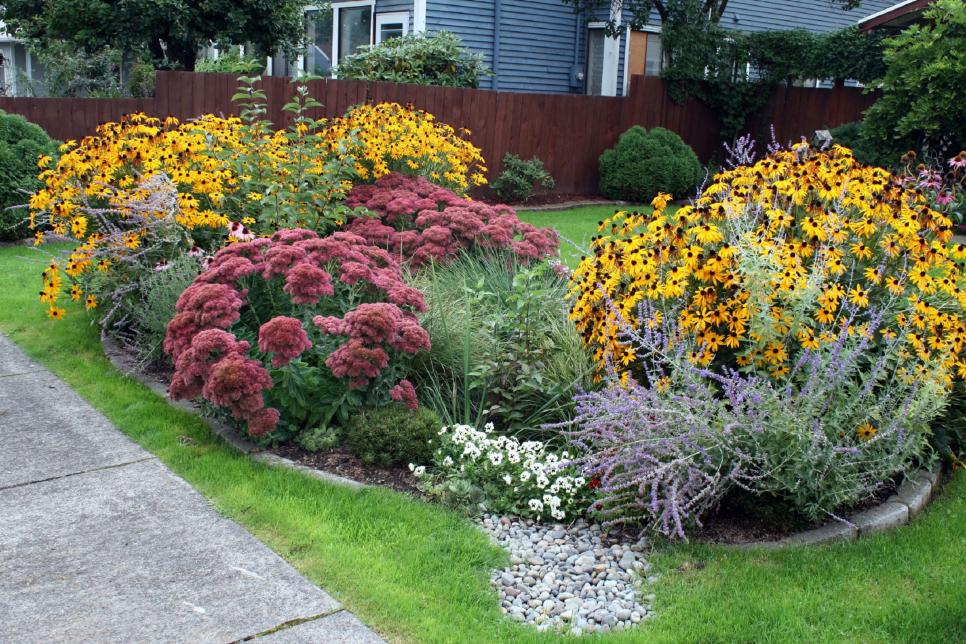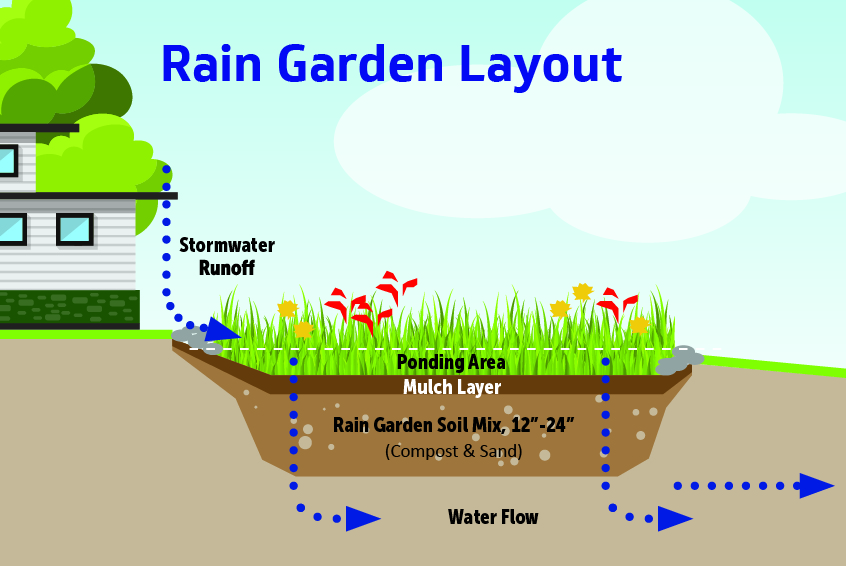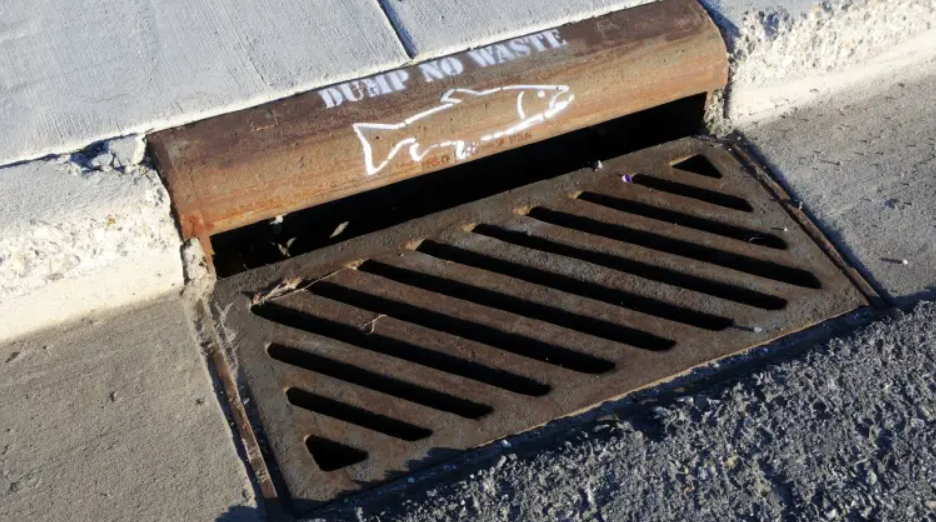'RainSmart Yards' provides benefits to local stormwater systems, waterways

By KATE COIL
TML Communications Specialist
An East Tennessee program aiming to help residents improve local water run-off and stormwater issues is hoping to go statewide.
RainSmart Yards is one of several programs operated by Chattanooga-based WaterWays, a non-profit focused on clean water initiatives in both Tennessee and the Caribbean. The organization was initially created 19 years ago to help bring safe water to Caribbean communities like St. Lucia, but founder and executive director Mary Beth Sutton said friends back home reminded her of clean water issues in her own backyard.

“One thing I’ve learned is that most water problems are the same around the world,” Sutton said. “It’s very interesting. The big three are erosion and sedimentation, treatment, and plastics in the water, especially microplastics that are not regulated at all in our drinking water systems. It makes it interesting to learn all of this. I started making connections with stormwater folks in Chattanooga, Hamilton County, and Signal Mountain, because that’s where I live. It kind of evolved from there.”
Sutton, who holds environmental science and education degrees from both the University of Tennessee at Chattanooga and UNC Chapel Hill, decided to connect her mission to bring clean, safe water to underprivileged communities in the Caribbean with the desire to educate friends and neighbors back in Tennessee with ways they can also contribute to clean water efforts in their own communities.
“Our foundation starts with education because there are so many people who don’t know that there is an issue with water or stormwater and that they can do something about it,” Sutton said. “Our goal is to help people make positive impacts in their watersheds for our water. We work on stream restoration projects, litter remediation, abandoned mine remediation, and three streambank stabilizations.”
Founded in 2018, the RainSmart Yards program is one of several outreach efforts the group does in East Tennessee to help educate homeowners on how they can use their own yards to help mitigate issues like stormwater run-off and contribute to their communities. The program initially started as a with a grant and a Chattanooga business owner, who was dealing with stormwater drainage issues in a parking lot.
Sutton said WaterWays worked with a local landscape architect and the business owner to implement a green infrastructure plan to develop a wetland on the property. The result was an 85% reduction in the property owner’s stormwater fee because the majority of the water coming off his property had to be infiltrated. The result gained the attention of the city of Chattanooga, and Sutton said Don Green, then an employee with the city of Chattanooga’s Stormwater program, suggested developing a reward program for homeowners who participated.

“We put something together, and actually went up to Vermont to look at a program there,” Sutton said. “We looked at programs all across the country and came up with RainSmart Yards. The program has taken off as people understand that they can do something in their own yard, which makes it so much easier to explain.”
Often times, Sutton said residents are just not educated on how human infrastructure impacts the natural flow of water during and after storms or that they can utilize things like native plants, green infrastructure, and knowing the slope and scope of their yards to improve not only their own stormwater intake but stormwater across their community.
“One of the things we look at is where your downspouts empty and if it has a rain guard,” she said. “We look where does your water drain, pesticide and herbicide use, does water drain onto another property or do you contain that water. The best way to contain water coming off your property is by planting native plants because they have longer infiltration capacity because they have longer roots. Mowing grass a little longer also means the grass will grow longer and that helps as well. Composting grass right on the yard also helps.”
Sutton said most residents are already doing a lot of RainSmart actions, such as planting pollinator plants, collecting and properly disposing of pet waste, using organic mulches, keeping septic tanks in working order, and riding their yards of invasive species like kudzu.
Through the RainSmart Yards program, WaterWays determines what “smart” tactics homeowners are using in their own yards and then presents those who make the cut with awards for their efforts. A site visit from WaterWays helps determine if a yard qualifies as an award-winner with the program. The three awards – bronze, silver and gold – correspond to how much effort residents are putting in to controlling stormwater on their property.

Residents who actively work to infiltrate water on their property through rain gardens, rain barrels, low-flow fixtures, erosion management activity, EnergyStar appliances, and green infrastructure qualify for higher rewards. The city of Chattanooga partners with the RainSmart Yards program by giving reduced stormwater fees to homeowners who have been awarded through the program.
Sutton said the RainSmart Yards program also encourages a little friendly competition between participating communities. Each year, the RainSmart Yards program and the city of Chattanooga pits themselves against the city of Knoxville and the University of Tennessee’s sister SmartYards program for the NoogaKnox Challenge. The city with the most certifications between World Water Day on March 22 to Sept. 23 is counted the winner.
A similar challenge dubbed the Battle of the Mountains also kicks off this year, pitting the municipalities of Lookout Mountain and Signal Mountain against each other to see which produces the most RainSmart participants.
The program has also drawn the attention of elected officials, including Chattanooga Mayor Tim Kelly, Knoxville Mayor Indya Kincannon, and Red Bank Mayor Hollie Berry who have all had their own yards examined as part of the program.
Ultimately, Sutton said the community approach programs like RainSmart Yards provides help individuals take part in solving larger issues, especially as issues like flooding and severe weather events continue to impact communities.
“Citizens will have more pollinators in their yard, including birds, bees and all those things we like to see. They won’t have wet spots or issues with drainage in their yards because they will have figured out how to drain it. They are helping the overall stream quality of their community. If they are infiltrating their water and everyone in their neighborhood is, that water is now rushing down to the stream and eroding the streambed. Private homeowners control the most land in a municipality, so it is incredibly helpful for a municipality who is trying to reach the stipulations of their stormwater permit. The program also helps stormwater officials do the outreach and education they are required to do as well as actively improve their stormwater output.”
After a presentation at the recent Tennessee Stormwater Association (TNSA) Conference, Sutton said communities outside of East Tennessee have been expressing industry in how RainSmart can expand into their municipality.
“We don’t want to just be in Chattanooga,” she said. “We are trying to figure out how do we manage expanding the program. We are thinking of doing the back-office stuff here and training city staffers to give out the awards. We would be glad to help or teach officials with any city across the state. When we started this program, we wanted to go statewide. We want to make sure everyone has the ability to do this, and I think we’re about there.”
For more information about the RainSmart Yards program or to connect with WaterWays, visit https://mywaterways.org/rainsmartyards/.
